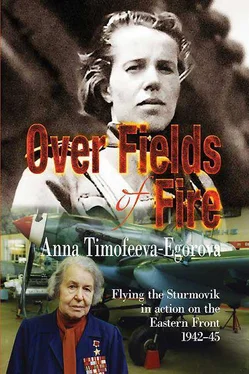Karev angrily axed the air with his hand and suggested: “Let’s drink, Anya Egorova. Let’s have our ‘frontline 100g ration’!”
On the tenth day of my stay with the SMERSh I ran out of patience. I rose off my trestle-bed and without saying a word moved towards the door. . I made it to that wide stairs and rushed to the first flour — straight for that major.
“Freeze, you whore! I’ll shoot!” That was a ‘fine hint’ a guard gave, rushing towards me. But I kept going up the stairs almost at a run. Where did I gain the strength for that? I think in the 18th century the Englishman John Bradman remarked: “Beware the anger of a patient man”. How right was he…
I flung the door open and from the doorway shouted (or was it that it only seemed to me that I was shouting?): “When will you quit taunting me?.. Kill me, but I won’t let you taunt me!”
I came back to my senses lying on the floor on the carpet. There was a glass of water next to me, but no one was in the room. I quietly sat up, drank the water, somehow dragged myself to the divan standing by the far wall, and sat down. Then the door opened and Major Fedorov entered. By that time I already knew his surname.
“Have you calmed down?” he asked politely.
I didn’t reply.
“Nine days ago the former POWs of the Küstrin ‘SZ’ camp — the doctors — were looking for you. They wrote all they knew about you. How you were captured, how you behaved and how they’d been treating you. They requested you be allowed to go with them to the Landsberg camp for a check-up, but we couldn’t do that then. It looked too suspicious — to preserve your decorations in such a hell. And moreover — to keep the Party membership card! To cut it short, you are now free to go. You are considered as being checked. If you want, stay with us and we will find you a job…”
“No, no”, I said hurriedly. “I wish to go back to my regiment. It is somewhere around there, fighting in the same sector…”
“You are free to go wherever you want”, snapped out the major.
“How will I go without a certificate? I would immediately be taken again, and placed somewhere once more!”
“We do not provide any certificates! If you want to go to your regiment, I advise you to come to a checkpoint at the road. You could then ask them to give you a lift to a proper place.”
“You have been taunting me major — and now you are laughing? Can’t you see: I can hardly walk! And who would get me into a car without a document? My regiment is in this sector — so give me a horse or a carriage. Or give me some certificate and a lift to the checkpoint — I beg you for Christ sake!”
The major had softened and did me a favor. He made a certificate with my whereabouts, one saying I had passed the check-up. Following that he ordered to get me on a carriage, bringing me to the checkpoint. There, I was advised where the headquarters of the 16th Aerial Army was located. They then put me onto a passing vehicle.
But from the Army personnel section I was immediately transferred to the Army-level SMERSh. “We will send an inquiry to the 34th Rifles Corps of the 5th Shock Army where they checked you out”, they told me. But the room I was placed into had all the utilities, and I was fed in the officer’s mess. The SMERSh chief’s wife brought me magazines and books. Some more women visited me, Army HQ officers, the pilots… They congratulated me on my return ‘from the world beyond’, I received many gifts. A whole pile of various things accumulated in my possession, and I remember someone joking: “So, Comrade Egorova, you’ve been to hell, now paradise awaits you…”
And one day Captain Tsekhonya came to see me. Unfortunately, I don’t remember his first or parental name but I will never forget his kindness! He had served in our 805th Ground Attack Regiment as an Adjutant in the 3rd Squadron. That was what they then called the position that is now called ‘Squadron Executive Officer’. As Deputy 3rd Squadron Commander I used to curse him over all sorts of ‘trifles’ although they say that there’re no trifles in the Air Force. But he was such a sluggish chap that I used to ‘push him’ a bit. Tsekhonya would not get angry at me (or would just pretend not to), but either way he would not repeat his mistakes. And now, having found out I was alive and that I’d been found, he came to visit me. The captain brought me a gift of some beautiful dresses and said: “I put together a parcel for my wife, but I found out you were alive and I’ve brought it to you…”
“What do I need dresses for?” I said apprehensively. “You’d better send it home to your wife, they are in great need after all, but those are useless here. Probably the quartermasters will supply me with a uniform blouse and a skirt?”
“You need treatment, Annochka”, Tsekhonya said affectionately and… burst into tears, staring looking for a handkerchief in his pockets…
Having received my letter, they reported from the Regiment to my Division: ‘Senior Lieutenant Egorova is alive and is on our sector of the front’. The division commander Colonel V. A. Timofeev then ordered our regiment Zampolit D. P. Shvidkiy to mount an ‘expedition’ to search for me. And now we were to meet…
I was sitting on a bench in the staff department of the 16th Aerial Army, waiting to be called. My crutch that assisted me in walking was next to me, there was also my straw handbag with the Soviet Air Force emblem and my initials, ‘A.E.’ This bag had been woven for me by the airmen — POWs of the Küstrin camp (currently it is stored in the Central Museum of the Armed Forces of the Russian Federation). Shvidkiy was first to notice me. Leaping out of the car, he rushed towards me with his arms flung open and nearly knocked me over! And I for some reason failed to recognise him straightaway: short, in a fur-lined flying suit and flying boots (it was still chilly) and an ear-flapped hat on his head, he was just like a bear cub! The surname Shvidkiy 172 172 Translator’s note — ‘quick’ in Ukrainian.
corresponded pretty well to the lively character of Dmitriy Polikarpovich. He quickly kissed me, sobbed through his nose, and ran to arrange documents for me so as to take me to the regiment immediately.
“No, no, don’t rush…” I told him.
“No, I’m going all the same, I’ll get you out of here!”
“The SMERSh here have still got me.”
“What SMERSh?”
He started making a noise, cursed, then ran away to draw up the documents. A group of submachine-gunners accompanying the zampolit approached too, then our aerial gunners, dressed in fur flying suits. They mobbed me, greeted me noisily, interrupted each other telling me the regiment news and only one man stood aside and, not hiding his grief, wept, while repeating: “And my Dousya was killed…” I looked closely at the crying man and recognised the aerial gunner Serezha whose death Dousya had bewailed so much. She had been stowing anti-tank bombs in the cockpit before her last sortie so as to avenge Serezha’s death…
During those same days my mum received a letter from me — it had been sent when I was still in the camp, by the tankers who had liberated us. Having received the letter, she read it several times, crossed herself and decided she was losing her mind. After all, there had been a death notice, pension had been given her instead of my pay, a reliable fortune teller had visited her and, finally, there had been a funeral in the church and an entry in the church commemoration book for the peace of soul of the ‘Warrior Anna’! “I’m going mad,” mum finally decided, crossed herself once again and headed to her neighbour’s. There she began to ask, handing the letter over to the boy: “Tolyushka, read this! I seem to be imagining things…”
Читать дальше












